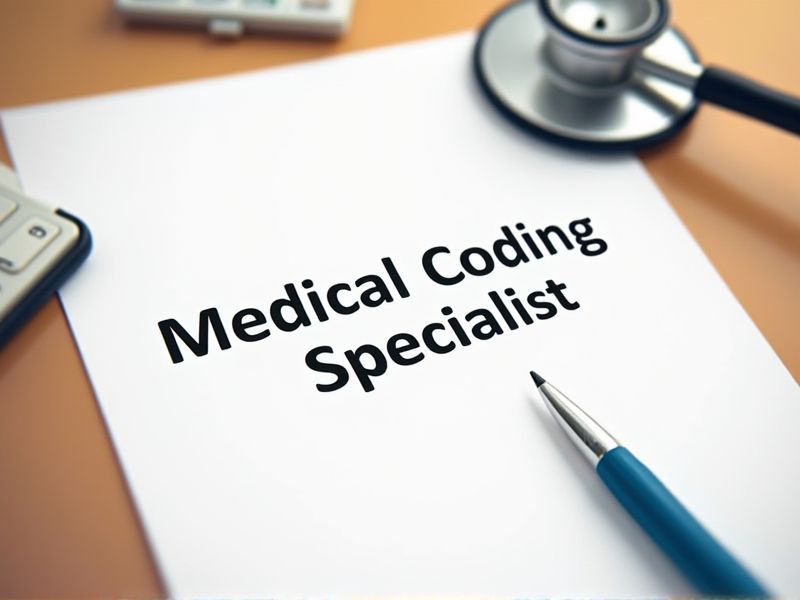
Medical Coding Specialists require specific certifications as these credentials ensure proficiency in understanding complex medical terminologies and coding systems. Certified professionals contribute to the accuracy of patient records, which directly impacts billing and insurance claims processing. Certifications also elevate employment opportunities and trust from healthcare employers. Key certifications vital for a Medical Coding Specialist include the following.
Certified Professional Coder (CPC)
The Certified Professional Coder (CPC) credential validates proficiency in medical coding, ensuring accuracy and compliance with healthcare regulations. Accurate coding directly impacts healthcare providers' reimbursement processes, reducing the likelihood of claim denials. Coders with CPC certification tend to have a deeper understanding of the Current Procedural Terminology (CPT), which enhances precise communication in billing. CPC-certified coders often demonstrate higher efficiency, which improves overall workflow and financial outcomes in medical practices.
Certified Coding Specialist (CCS)
Certified Coding Specialists (CCS) provide a verified level of expertise that enhances accuracy in medical coding, which is crucial for proper billing and insurance claims. By obtaining CCS certification, coding specialists are recognized for their advanced skills, leading to increased trust from employers and potentially higher salaries. The healthcare industry relies heavily on precise data for patient care and compliance, and CCS professionals ensure that medical records are coded accurately and in line with regulations. As regulations and coding standards evolve, CCS holders are equipped to stay current, mitigating the risk of errors and facilitating smoother healthcare operations.
Certified Inpatient Coder (CIC)
Certified Inpatient Coders (CICs) are essential because they possess specialized knowledge in hospital inpatient coding, ensuring accurate and comprehensive translation of medical services into standardized codes. This accuracy is critical for proper reimbursement processes, reducing the likelihood of billing errors and financial discrepancies. Employers prefer hiring CICs to enhance compliance with healthcare regulations and minimize risks of audits and penalties. CICs contribute to improving patient care quality by maintaining precise healthcare data, crucial for research and policy planning.
Certified Outpatient Coder (COC)
Certified Outpatient Coders (COC) play a crucial role in ensuring compliance with healthcare regulations, reducing the risk of audits and penalties for healthcare facilities. Accurate coding by COCs enhances revenue cycle management by minimizing billing errors and ensuring proper reimbursement. Their expertise in outpatient procedures allows for detailed and precise coding, which supports better data collection and analysis for healthcare improvements. Demand for COCs impacts healthcare operations by enhancing the quality of patient care documentation and optimizing operational efficiency.
Certified Coding Associate (CCA)
The Certified Coding Associate (CCA) certification ensures a standardized level of competency and accuracy among medical coding specialists. Employers trust CCA-certified individuals since their skills have been validated by a recognized body, reducing errors and boosting productivity. The credential can enhance career prospects by distinguishing candidates in a competitive job market. Certification often results in higher earning potential and job security for medical coding specialists.
Certified Professional Medical Auditor (CPMA)
Certified Professional Medical Auditors (CPMA) enhance the accuracy of medical billing and coding processes, preventing revenue losses for healthcare facilities by identifying discrepancies. They ensure compliance with healthcare regulations, reducing the risk of audits and penalties that could financially impact organizations. Their expertise in auditing medical records and documentation strengthens the credibility and reliability of the coded information, leading to improved communication with insurance providers. Professional growth and career opportunities for Medical Coding Specialists expand with CPMA certification, increasing their marketability and potential for higher compensation.
Certified Risk Adjustment Coder (CRAC)
Certified Risk Adjustment Coders (CRAC) are essential because they ensure accurate documentation of patient health data, impacting reimbursement rates. Proper coding by CRACs directly influences resource allocation for healthcare providers, aligning it with patient needs. They mitigate compliance risks by maintaining adherence to regulatory standards in risk adjustment models. As healthcare payment models increasingly shift towards value-based care, CRACs play a pivotal role in optimizing revenue and patient outcomes.
Certified Documentation Improvement Practitioner (CDIP)
Certified Documentation Improvement Practitioners enhance the accuracy of medical records, which improves the coding process for Medical Coding Specialists. Accurate documentation increases reimbursement accuracy, benefiting healthcare facilities financially. CDIPs bridge communication between healthcare providers and coders, ensuring precise clinical data representation. Proper documentation reduces audit risks and enhances compliance with regulatory standards.
Certified Medical Reimbursement Specialist (CMRS)
The Certified Medical Reimbursement Specialist (CMRS) plays a crucial role in ensuring that medical coding specialists accurately capture and process billing codes, which directly impacts the financial health of healthcare providers. Accurate reimbursement claims reduce the risk of denied or delayed payments by insurance companies, which ensures smooth revenue cycles. A CMRS's expertise in navigating complex billing rules and regulations enhances compliance with national healthcare policies. The CMRS certification signifies a professional standard that reassures both healthcare providers and patients of the accuracy and ethical handling of billing and insurance claims.
Registered Health Information Technician (RHIT)
Registered Health Information Technicians (RHITs) ensure accuracy in medical records, which enhances the integrity of the coding process for Medical Coding Specialists. Their expertise in electronic health records allows them to effectively organize and manage data, which supports precise coding techniques. RHITs play a crucial role in maintaining compliance with healthcare regulations, essential for accurate billing and reimbursement. Their skills in data privacy and security ensure that patient information is protected, facilitating a trustworthy healthcare environment.
Summary
When you obtain certifications as a Medical Coding Specialist, your credibility in the field increases significantly. Employers often prioritize candidates with recognized credentials, which can lead to enhanced job prospects and potential salary growth. Certification can result in a deeper understanding of industry standards, improving your proficiency and accuracy. Greater career advancement opportunities also emerge as your expertise becomes more recognized in the healthcare sector.
